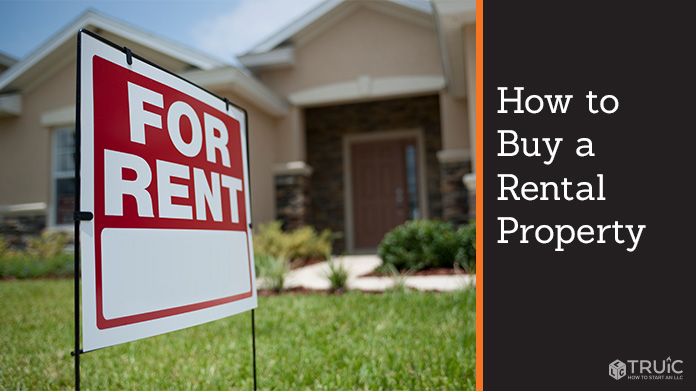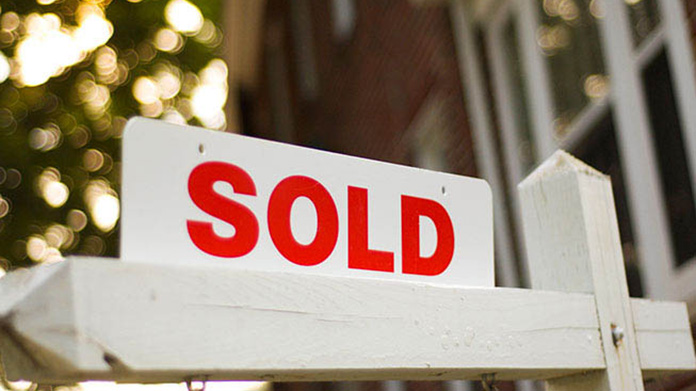How to Buy Rental Properties
Buying a rental property is a great way to bring in passive income and grow your real estate investment business.
Our guide covers how to buy rental property and help your rental property investment business become successful.
Recommended: Read our guide on How to Start a Real Estate Investment Business.

Steps to Buying Rental Property
Buying a rental property starts with acquiring a funding source. Whether you have a traditional mortgage, you are utilizing real estate crowdfunding, or another funding source — securing funding is the first step to getting your buy and rent real estate business up and running.
SKIP AHEAD
Step 1: Find a Rental Property
Step 2: Evaluate the Property
Step 3: Flip the House
Step 4: Market Your Real Estate Listing
Step 5: Sell Your Property
Step 1: Find a Rental Property
The first step to buy and rent real estate is finding a property within your budget that will provide a return on investment that meets or exceeds your financial goals. Unlike house flipping or wholesaling, when you buy a rental property, it is a good idea to avoid distressed properties or fixer-uppers that postpone renting the property and require a larger investment.
Here are some tips to get started on finding a rental property:
Research Different Markets
The location of your rental property will affect the purchase price as well as the amount you will be able to charge for monthly rent. Factors include proximity to major cities, universities, public transit, the density of the workforce, crime rates, and the upkeep of the neighborhood.
Decide the Type of Rental Property
There are four different types of rental properties: single-family residential homes, multi-family residential homes, vacation rentals, and commercial rentals. Deciding on the type you are looking for is important before you begin your property search.
- Single-family residential homes are a stand-alone home intended for one family’s occupancy.
- Multi-family residential homes are a single building intended to house more than one family. This could be anything from a duplex to a small apartment building.
- Vacation rentals can be rented on a nightly, weekly, or monthly basis for travelers or business professionals.
- Commercial properties are buildings used or leased for business activities.
For rental property beginners, we recommend starting with a single-family residential home. This property type is the easiest to manage and maintain while mastering the skill of managing a rental property.
Start the Search for Discounted Properties
To achieve a high return on investment and stay within your budget, you are most likely looking for cheap properties to repair and rent that will get you or your funding source close to your financial goals. There are several ways to find rental properties:
- Reach out to an established landlord. The benefits of buying a property from an established landlord are an existing tenant relationship, renter history for the property, and fewer repairs required compared to a distressed property or fixer-upper.
- Find the property yourself. If you have the time to dedicate to your property search, you can begin looking in your city or town in a number of ways. To start, dedicate about three hours a week to “driving for dollars,” wherein you drive around your local area searching for a number of distressed properties to inquire about, or join a local Real Estate Investment Association (REIA).
- Use an investor-friendly realtor. This is a real estate agent that will understand your situation and help you to make a quick, easy sale. However, you will have to pay a fee for their services, which is typically around 4% of the sale.
Recommended: For more information about finding deep-discounted properties, read our tips to finding off-market properties in our guide to starting a real estate wholesaling business.
Step 2: Evaluate, Purchase, and Repair the Property
Once you’ve found a house to flip in a market that works with your budget and experience level, the next step is to evaluate the property. This is essential to establishing the amount you will offer for the property — as well as whether the property is a good investment.
Make sure you’re working with a lender who understands your goals. Read our Best Mortgage Lenders for LLC Owners review to learn more.
Walkthrough the Property
During your walkthrough of the property, you are looking to gather as much information about the property as possible. This mainly pertains to deferred maintenance or any major issues such as replacing air conditioning or plumbing.
If you will be utilizing the services of contractors in property rehabilitation, you will want to bring them along to assess repairs and give you an estimate before making an offer.
Additionally, you should keep a detailed list of the repairs required to rehabilitate the property as well as additional cosmetic needs such as paint or tiles.
Make an Offer
There are several circumstances that will inform the amount you offer for each particular property. It is always important to speak with your real estate attorney before signing or drafting a contract. Here are some things to keep in mind before making your offer:
- The After Repair Value (ARV) of the property. In order to make this a lucrative house flip, your offer should be between 40-60% of the ARV.
- The price of recently sold properties within a mile radius. Typically this means the home will have a similar number of bedrooms, number of bathrooms, home type (split-level, ranch style, etc.), and amount of acreage.
- The number of repairs required before you can rent the property. Ideally, a buy and rent real estate investment isn’t a fixer-upper. The goal is to find a property that you can put on the rental market as soon as possible.
Learn about the different types of home loans available to LLC owners. Read our Types of Mortgages for Business Owners guide for more information.
Repair the Property
In order to rent out your property, you will need to update the home to make it livable and easy to rent. For large repairs, we recommend that you hire contractors to help with the rehabilitation to ensure your property is ready for tenants.
How to Find Contractors
If you choose to use contractors to complete the rehabilitation, finding the right contractors for the job is essential to the success of your house flip. The contractors you may need include general contractors, electricians, roofers, plumbers, painters, HVAC professionals, or even low-cost handymen.
Your priority is to build a strong network of contractors to work on a variety of projects such as electrical work or plumbing. If you plan to continue flipping houses, it is important to develop a group of trusted contacts to get the job done efficiently, every time.
Here are some tips for finding contractors in your area:
- Ask around the real estate community. Utilize real estate investor forums and communities in your area about contractors they know and trust.
- Read reviews and shop around before committing to one company or contractor. Don’t just go with the first contractor you talk to, explore your options before settling on one.
- Once you hire at least one contractor you trust, ask for their recommendations to fill the additional roles. For example, your electrical contractor may have an HVAC expert they regularly work with that you can add to your roster.
Things to Keep in Mind When Hiring Contractors
As with any contractual relationship, hiring a contractor to repair and rehabilitate your property will require the help of an attorney. We recommend that you go through any legal documents with your real estate attorney prior to signing a contractor onto your project.
In addition to this, you should consider filing a Waiver of Liens. This is a document that states the contractor will have no right to claim property or assets in order to satisfy a debt. Once the contractor is done and the final payment for their services is complete, they must sign this document.
Step 3: Hire a Property Manager
Once your property is ready to rent, you need to consider how the property will be managed — either by a property manager or independently.
Hiring a Property Manager vs. Managing the Property Yourself
Hiring a property manager will decrease your monthly income; however, the benefits of using a property manager — especially for a first time real estate investor — can often make up for the additional expense.
Property managers are skilled professionals experienced in marketing properties, finding tenants, and maintaining contact. They serve as a middleman between you and your renter, which can be especially helpful if you are employed while concurrently investing in real estate.
How to Find a Property Manager
If you’ve decided to hire a property manager instead of managing your rental property yourself, then it’s time to find the right property manager for your rental. There are many ways to find a property manager, but here are some tips to help you find the right person for your real estate investment:
- Utilize the real estate community. Forums and methods of communication with the real estate community offer the opportunity to generate leads on trustworthy property managers and management companies.
- Do some online research. Compare property management rates, reviews, and any other information you can source online to narrow down your options.
- Don’t settle on the first one you meet. Shop around for managers/management companies to find the right one for your needs.
- Visit their properties before hiring them. This is a great way to vet potential property managers as the state of their current properties will give you an idea about their tenant selection and how well they maintain their properties.
Tips for Managing a Rental Property Yourself
If you are going to try your hand at rental property management, there are a few things to keep in mind:
- The more you know about property management, the better. Talk to an experienced landlord — preferably in your area — about the ins and outs of managing rental properties successfully.
- Research and understand your legal obligations. Talking to an attorney prior to signing a lease with a tenant is important for understanding your obligations as a landlord and a crucial step to renting your rental property.
- Set a fair price for the property. You want the most profit you can get out of the property, but pricing the unit too high can lead to a rental sitting on the market, which means you are losing money.
- Keep up with maintenance. Things like smoke alarms, ventilation systems, and pipes are important to keep up to date.
Keep in mind that your rental property is a business. Your effort and diligence to learn how to be a great property manager and the care you put into your property can result in longer-lasting, dependable tenants and, in turn, income.
Step 4: Find a Tenant
If you are working with a property manager, they will most likely market your property and vet potential tenants. However, it is common for the property owner to have a say in potential tenants, but it is not required.
If you are acting as your own landlord, you want to find tenants that fit your criteria without wasting too much time. A good place to start is by marketing your property online with the tenant criteria outlined clearly.
Once you have one or more prospective tenants that meet your financial and lifestyle criteria (no smoking, no pets, etc.), we recommend having a go-to tenant screening process. This can entail an application fee, credit check, employment verification, proof of pet vaccination, and any additional information you require to make the right decision.
Step 5: Maintain the Property
Up-to-date property maintenance is important to sustaining happy tenants and healthy long-term investment. If you are utilizing a property manager or management company, you will most likely have two options for maintaining your property:
- Request that the property management company take care of any maintenance issues on the property. This will cost you more; however, if you have a busy schedule or aren’t living in the area — having your property manager take care of maintenance is extremely helpful.
- If you are confident in your maintenance abilities or want to save a little extra money, you can do repairs to your property as needed. This is best for experienced local property owners.
Reinvest Your Profits and Grow Your Business
Once you’ve mastered the basics of property management, you can use the profits you’ve earned to reinvest in another property.
As you become more familiar with the buy and rent process, you can move onto bigger real estate investments such as multi-family residences, apartment buildings, or commercial real estate — to grow your buy and rent real estate business.





